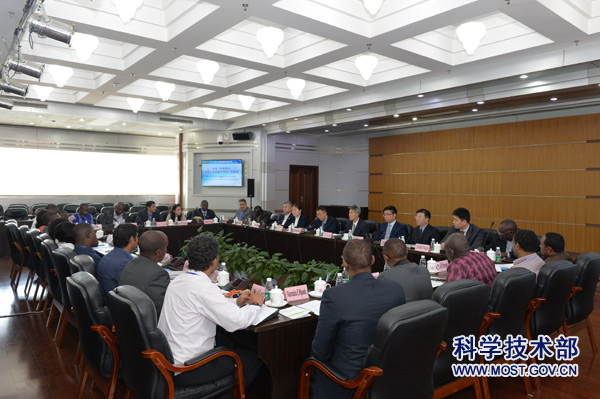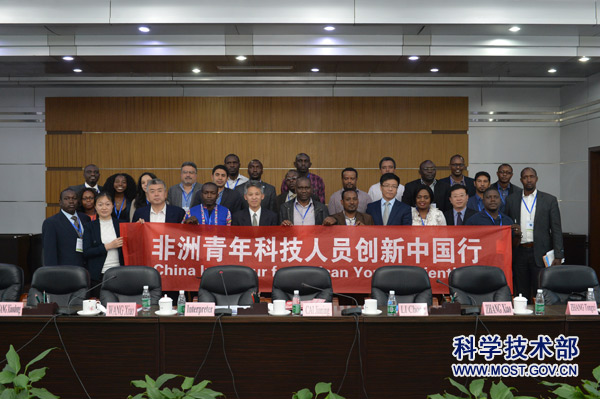

On the morning of May 6, 2019, the First China InnoTour for African Young Scientists co-sponsored by the Department of International Cooperation of the Ministry of Science and Technology, the Department of African Affairs of the Ministry of Foreign Affairs and the Science and Technology Department of Hubei Province opened in Beijing. Twenty-five young scientists and science and technology administrators from 18 African countries including Egypt, South Africa, Kenya, Ethiopia, Tanzania and Nigeria visited the Ministry of Science and Technology (MOST) in the first stop of the event. Deputy Director-General Cai Jianing of the Department of International Cooperation of MOST, Deputy Director-General Li Chong of the Department of African Affairs of the Ministry of Foreign Affairs and other Chinese representatives held cordial discussions with the delegates.
Deputy Director-General Li Chong welcomed the delegation of China InnoTour for African Young Scientists for their visit to China and gave the delegates a comprehensive introduction to China-Africa relations and China‘s relevant policies towards Africa. He pointed out that the successful convening of the Forum on China-Africa Cooperation Beijing Summit in September 2018 produced a positive effect on China-Africa relations and attracted wide attention of the international community, making it a milestone event in the history of China-Africa cooperation. He noted that China-Africa relations are now at the best stage of development in history and that both sides should fully understand the tradition of friendship in China-Africa relations, grasp that China-Africa relations are the core of South-South cooperation and comprehensive cooperation, and build a stronger China-Africa community with a shared future. Deputy Director-General Li Chong said that China-Africa cooperation should focus on three aspects at the next stage: improving quality, enhancing efficiency and benefiting the people.
Deputy Director-General Cai Jianing remarked that China and Africa both face the challenges of promoting economic development and improving people’s livelihood and social progress and should work together to find solutions. He pointed out that the Ministry of Science and Technology of China has always attached great importance to strengthening cooperation and exchanges with African countries in STI. Since 2009, the MOST has successively launched the China-Africa Science and Technology Partnership Program and the China-Africa Science and Technology Partnership Program 2.0 to forge pragmatic, efficient and dynamic new science and technology partnerships with African countries. Deputy Director-General Cai Jianing noted that the launch of the Belt and Road Science, Technology and Innovation Cooperation Action Plan in 2017 has created new opportunities and opened up new channels for China-Africa cooperation. Within the framework of the Action Plan, the two sides have made efforts to promote four major initiatives, namely the Science and Technology People-to-People Exchange Initiative, the Joint Laboratory Initiative, the Science Park Cooperation Initiative and the Technology Transfer Initiative, so as to boost the high quality development of China-Africa cooperation in STI. He said that seeing is believing and hoped that the delegates could gain a more intuitive and profound understanding of China‘s economic, social and technological development through their visits and make active contributions to deepening scientific and technological cooperation and promoting friendship between the Chinese and African peoples.
In the talks, some African youth representatives shared their views and opinions. Soha Mohsen Mohamed Mostafa, EU Project Assistant at the Ministry of Higher Education and Scientific Research of Egypt, said that to realize its 2030 Vision, Egypt attaches great importance to research innovation and youth education and training, and actively carries out exchanges and cooperation with young scientists in China. More than 160 Egyptian researchers have been funded to do research in China, which greatly raises the level of research in Egypt. Yibeltal Ayalew Akele, Advisor to the Minister of Science and Higher Education of Ethiopia, shared the same sentiment. He said that to address skilled labor shortage in Ethiopia, the Chinese government has offered scholarships to more than 5,000 Ethiopian students and that STI cooperation between Africa and China has greatly benefited Ethiopia. He also looked forward to seeing more in-depth cooperation between China and Africa in the fields of science, technology and economy in the future. The two sides also discussed China-Africa trade, cooperation in science and technology and other issues of common interest.
China InnoTour for African Young Scientists aims to implement the outcomes of the 2018 Forum on China-Africa Cooperation Beijing Summit, strengthen dialogue and exchanges between young scientists and technicians in China and Africa, and promote STI cooperation between China and African countries. During its stay in Beijing, the delegation visited Dongsheng Science Park, Tsinghua University, China Academy of Space Technology and Chinese Academy of Agricultural Sciences. The delegation then went to Hubei to continue their STI-themed events and visited relevant research institutions, universities and high-tech zones in Hubei.

